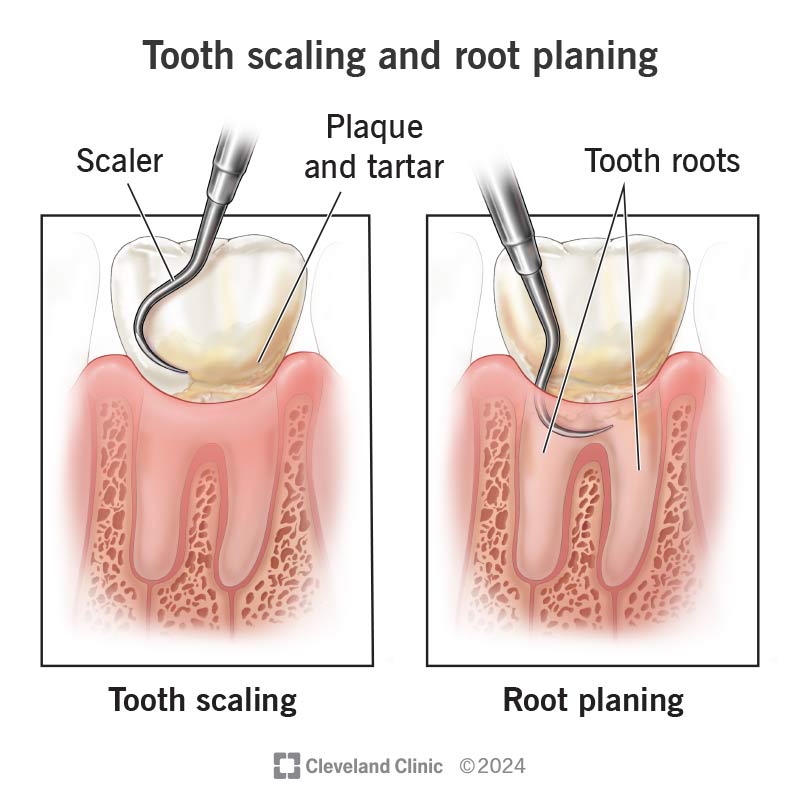Scaling and root planing is a deep dental cleaning. It removes tartar and bacteria that build up around the roots of your teeth. Dentists and periodontists may deep clean your teeth if you have mild or moderate gum disease. This treatment can help sore, bleeding gums, prevent tooth loss and give you the best chance for long-lasting oral health.
Advertisement
Cleveland Clinic is a non-profit academic medical center. Advertising on our site helps support our mission. We do not endorse non-Cleveland Clinic products or services. Policy

Scaling and root planing is a term dentists use to describe a deep dental cleaning. It’s sort of like a regular dental cleaning, except it reaches deeper beneath your gums.
Advertisement
Cleveland Clinic is a non-profit academic medical center. Advertising on our site helps support our mission. We do not endorse non-Cleveland Clinic products or services. Policy
You might need a deep dental cleaning if you have periodontitis. Symptoms of periodontitis include swollen or bleeding gums. Tooth scaling removes plaque and tartar above the gumline. Root planing smooths your teeth roots and removes plaque and tartar below your gumline. Together, tooth scaling and root planing can get rid of disease-causing bacteria and improve your overall oral health.
Healthcare providers who can deep clean your teeth include:
Scaling and root planing is a nonsurgical treatment. It’s usually the first line of treatment for mild to moderate gum disease.
When you go in for tooth scaling and root planing, your dentist or hygienist will:
Your provider will use hand scalers or ultrasonic instruments to deep clean your teeth. They may also inject antibiotics around your teeth roots or prescribe oral antibiotics for you to take after the procedure.
A deep dental cleaning takes one to two hours to complete. Your dentist might do everything in one visit. Or they might clean half your teeth during one appointment and the other half during a second one. It all depends on your situation and preferences and your dental insurance plan.
Advertisement
Ideally, you’ll need scaling and root planing only once. After your dentist removes the tartar and bacteria, regular dental cleanings and good oral hygiene should help keep you on track. The goal is to improve the health of your gums so you won’t need another deep cleaning.
A dental deep cleaning can:
Complications are rare, but they can happen. Potential risks include:
It can vary, but most people can return to their normal routines the same day. Scaling and root planing is much less invasive than other gum disease treatments. You won’t need incisions or stitches, and you can eat and drink whatever you like as long as it doesn’t hurt.
Your dentist will give you a list of instructions specific to your situation. Following their guidelines will help you recover quickly. Be sure to ask questions beforehand if something isn’t clear.
Let your dentist know if you develop:
Yes, a deep dental cleaning is the only way to remove plaque and bacteria deep under your gums. While brushing and flossing is always a good thing, your toothbrush can’t reach all the way down to your teeth roots. You need both professional cleanings and good habits at home to maintain healthy teeth and gums.
As an adult, you only have one set of teeth. No one wants to risk losing them to advanced gum disease. Thankfully, tooth scaling and root planing can save your smile if you develop periodontitis.
Only a dental professional has the necessary tools and expertise to remove the tartar that causes periodontal disease. But daily brushing and flossing can keep your teeth and gums healthy. To lower your chances of another bout of gum disease, ask your provider to show you how to properly brush, floss and take care of your teeth.
Advertisement
Dentistry plays an important role in oral health. Cleveland Clinic’s experts can design a personalized plan that will keep you smiling for the long haul.

Last reviewed on 12/02/2024.
Learn more about the Health Library and our editorial process.